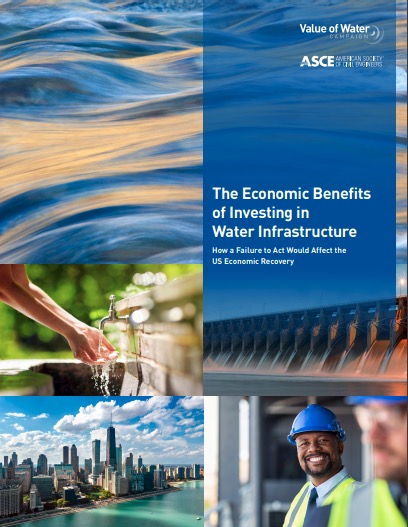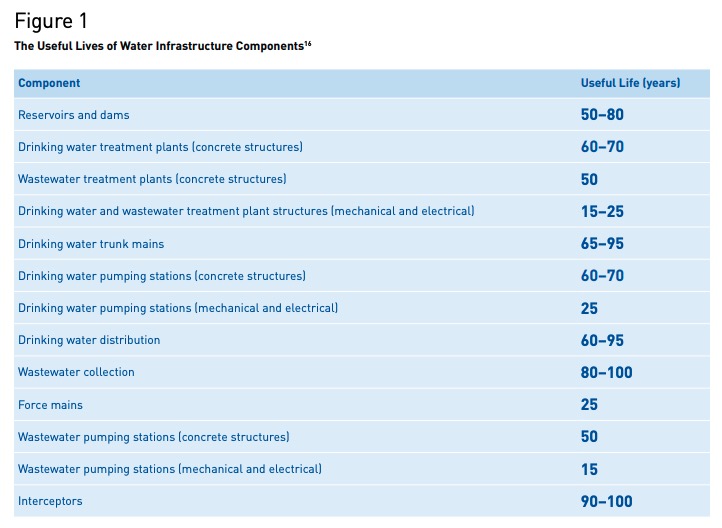AMERICAN SOCIETY OF CIVIL ENGINEERS
VALUE OF WATER CAMPAIGN
The Economic Benefits of Investing in Water Infrastructure: How a Failure to Act Would Affect the US Economic Recovery
Introduction
 The American Society of Civil Engineers (ASCE) and the Value of Water Campaign release this report at a time when the COVID-19 public health crisis is causing economic disruption at an unprecedented speed and scale in the United States. Workers are losing jobs by the millions as consumer confidence, retail sales, and gross domestic product plummet. It is clear that the nation’s economic recovery will be long and difficult. In the coming months and years, public officials at every level of government will consider policies and investments to jumpstart economic recovery. Investment in the nation’s aging water infrastructure—composed of drinking water, wastewater, and stormwater systems—can spark a new era of job creation and economic growth while protecting public health and improving the quality of life for families across the United States.
The American Society of Civil Engineers (ASCE) and the Value of Water Campaign release this report at a time when the COVID-19 public health crisis is causing economic disruption at an unprecedented speed and scale in the United States. Workers are losing jobs by the millions as consumer confidence, retail sales, and gross domestic product plummet. It is clear that the nation’s economic recovery will be long and difficult. In the coming months and years, public officials at every level of government will consider policies and investments to jumpstart economic recovery. Investment in the nation’s aging water infrastructure—composed of drinking water, wastewater, and stormwater systems—can spark a new era of job creation and economic growth while protecting public health and improving the quality of life for families across the United States.
Water is essential to every aspect of household and community life and the economy. Dozens of industries, like mining, manufacturing, and health care, rely directly on water and wastewater services to function. If they lost access to clean water supplies, the economic impact would be acute. Meanwhile, the COVID-19 pandemic has shown that the public health benefits from safe drinking water and wastewater treatment are immeasurable. Much of the nation’s vast water infrastructure is buried underground or out-of-sight, but it is hard to overstate how vital these systems are for people’s health and the economy.
Like so much else in the US economy, water utilities have been affected by the effects of the COVID-19 pandemic. Tourism and convention activities have canceled, sports arenas have closed, hotels and schools have emptied, and many restaurants and bars have been operating at less than maximum capacity—all of which translates to reductions in water consumption and rate revenues. It is uncertain when full economic activity will return. The American Water Works Association (AWWA) and the Association of Metropolitan Water Agencies (AMWA) estimate that drinking water utilities will experience a negative aggregate financial impact of $13.9 billion— or 16.9 percent—by 2021, due to revenue losses and increased operational costs during the pandemic. The National Association of Clean Water Agencies (NACWA) estimates that the resulting financial impact on wastewater utilities will be even higher, around $16.8 billion, including a 20 percent drop in sewer revenues.
The financial challenges water utilities face as a result of the COVID-19 pandemic are layered onto chronic, longterm, and insufficient investment in the nation’s water infrastructure. Billions of dollars are needed each year to renew and replace outdated pipes, pumps, storage facilities, and treatment plants that ensure clean water delivers to homes and businesses across the nation, carry away and safely treat sewage and stormwater, and return treated water to rivers, streams, and other water bodies. Local, state, and federal funding is meeting a fraction of the current need. If this trend continues, the nation’s water systems will become less reliable, breaks and failures will become more common, vulnerabilities to disruptions will compound, and the nation will public health and the economy at risk.
This report details the cost to the nation’s economy if current investment trends in the nation’s water infrastructure continue, and it explores the massive economic benefits people would realize from fully funding the nation’s water infrastructure needs. The report is organized in the following manner:
- The US Water Infrastructure Investment Gap section summarizes the mismatch between the current spending levels and funding needs.
- The Costs of Inaction section analyzes the impact on gross domestic product (GDP), businesses, households, and public health if current investment trends in water infrastructure continue for the next 20 years.
- The Economic Benefits section describes the economic gains that could be realized over the next 20 years if the water infrastructure investment gap were closed and spending needs fully funded.
The United States is entering what may be the deepest economic contraction since the Great Depression.3 As such, the policy and investment decisions that public officials make will have enormous consequences on the pace of economic recovery. This analysis presents two very different futures. If current underinvestment in water continues, businesses will become less competitive, household costs will increase, GDP will shrink, and public health may be at greater risk. If the United States acts boldly and closes the water infrastructure investment gap, we will boost economic recovery, create jobs, fuel business activity across a wide range of sectors, improve public health, and protect the environment.
ASCE created the Infrastructure Report Card to assign grades for the nation’s infrastructure based on condition, safety, capacity, and other factors. The most recent report card assigned drinking water and wastewater infrastructure a D and D+, respectively. Closing the investment gap would be equivalent to the nation’s water infrastructure achieving at least a “B” letter grade, reaching a state of good repair and posing a minimal risk, or an “A” letter grade, a standard of resilience and capacity that is fit for the future.
Download full version (PDF): The Economic Benefits of Investing in Water Infrastructure
About the American Society of Civil Engineers (ASCE)
www.asce.org
The American Society of Civil Engineers represents more than 150,000 members of the civil engineering profession in 177 countries. Founded in 1852, ASCE is the nation’s oldest engineering society. Through the expertise of its active membership, ASCE is a leading provider of technical and professional conferences and continuing education, the world’s largest publisher of civil engineering content, and an authoritative source for codes and standards that protect the public.
About the Value of Water Campaign
www.thevalueofwater.org
The Value of Water Campaign educates and inspires the nation about how water is essential, invaluable, and in need of investment. Spearheaded by top leaders in the water industry, the Value of Water Campaign is building public and political will for investment in America’s water infrastructure.
Tags: American Society of Civil Engineers, ASCE, Value of Water Campaign







 RSS Feed
RSS Feed